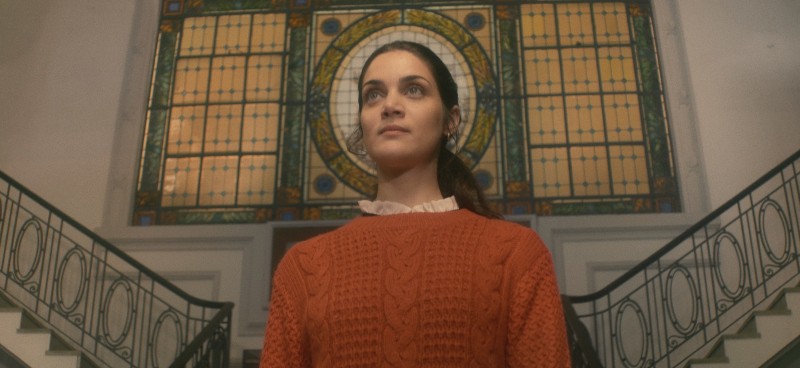This review of Ghosting Gloria is part of our coverage of the 2021 Fantasia Film Festival.
Gloria has a problem. Not only is she woefully single, but she can’t remember the last time she had an orgasm. And if you think that’s bad, even worse is that she may never have even had a single orgasm before in her life. The premise of Marcela Matta and Mauro Sarser‘s sophomore feature, the Spanish-language Ghosting Gloria, is certainly a welcome one – a woman seeking a more fruitful sex life finds unexpected pleasure in the phantasmagoric. It’s a unique concept that also puts the female orgasm (something all too often stigmatized in film and, well, everywhere) front and center. At a time when mainstream cinema feels bereft of palpable sexuality, one must naturally look to the outer reaches of smaller films for better depictions of lust on screen. Billed as a “whimsical, somewhat unconventional and subversive, romance,” with “moments of mindblowing…erotic comedy,” Ghosting Gloria is, in actuality, a tepid, rather than titillating exploration of sex, love, and self-discovery, as ultimately restrained in its depictions of sensuality as it is in its attempts at humor.
Gloria (Stefania Tortorella) is a reserved and well-read bookstore employee – a humdrum job she is nevertheless quite passionate about, working alongside her far more sexually liberated friend Sandra (Nenan Pelenur), where the pair regularly bemoan their “dickhead,” “assface” store manager. Stuck in the doldrums of an unfulfilling dating life as she yearns for romantic affections, Gloria becomes fed up with the relentless, nightly sex sounds from her noisy and horny upstairs neighbors. So, she decides to rent out her apartment and live elsewhere until she can find a new place. After relaying this news to Sandra, Gloria is hooked up with the dead friend of a friend’s apartment, a man who recently and suddenly passed away from a freak brain aneurysm. Though armed with reservations towards moving into a new place where someone may have just died, Gloria takes Sandra up on the offer. And sure enough, shortly after Gloria moves in, she discovers that this dead former tenant, Dante (Federico Guerra), never really left – that his spirit still lingers within the walls of his former residence, his soul not quite yet finished with its business on earth. And, also, it desperately wants to fuck.
After mistaking her preliminary otherworldly encounter for psychological issues, Gloria discovers that Dante’s ghost pleasures her with such riveting sexpertise that she is able to climax not just once, but over and over and over. Thus, Gloria starts up a sexual and romantic relationship with the undead, something that proves to be just as satisfying – if not more so – than dating a man with a corporeal form. However, once Dante’s lifeforce unexpectedly vacates the apartment, Gloria reluctantly returns to a life among the living, forced to confront her idealistic expectations towards men and relationships. But it’s here where the narrative of Ghosting Gloria begins to taper off, the sluggish screenplay credited to co-director Sarser. Any excitement begat from the film’s initially riotous portrayals of unearthly cunnilingus are henceforth forgone, as Gloria embarks on a mostly unengaging journey of self-discovery, padded extensively with deflating conversations crawling towards a conclusion that doesn’t feel like it’ll ever come to fruition.
The most important male characters are kept largely out of shot until around the film’s second act, director of photography Germán Luongo using clever camera framing in order to keep their faces obscured from both the audience’s and Gloria’s, point of view. It’s all meant to be symbolic of the way Gloria perceives men, fully expounded upon once Dante has left from her life for good but referenced in an earlier scene in the film. In it, Gloria had unenthusiastically attempted to court a man at a party at Sandra’s urging, but found it difficult when he proved to not be mentally stimulating enough for her.
This paves the way for the reveal that Gloria has been yearning to date a man whose personality resembles her favorite authors. She wants a Hemingway or Mailer to sweep her off her feet with a bout of thought-provoking discussion until she comes to the dismaying comprehension that all of these men who she romantically idealizes were plagued with their own ugly failings like any other human being. Ultimately, the man Gloria wants does not exist, which makes all the more sense why she would prioritize a bond with a lover who isn’t real, either.
It’s a particularly shallow metaphor for a film that had the potential in its premise to make up for its superficial examination of intimacy – and also mortality – by being surreal or at least visually interesting, but is neither. Even the music cues are reminiscent of royalty-free stock music that might be dropped into any number of straight-to-DVD comedies. The most fantastical aspects of the film are still presented in a straightforward way, and Ghosting Gloria, though certainly sex-positive, ends up nonetheless dishearteningly unwilling to fully reckon with human sexuality.

